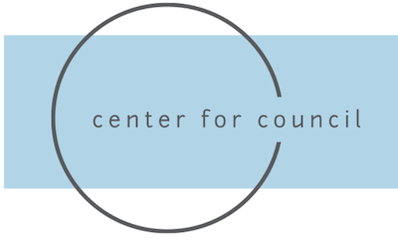 A critical challenge for social justice organizations as you advocate for positive social change is to listen deeply to the communities in which you work. Recognizing your mandate to voice the needs of the populations that you serve, your team will serve most effectively by developing the capacity to listen deeply and understand the context and history of your communities. At Center for Council, we believe that when a staff participates in Council, an opportunity emerges for employees and peers to develop greater rapport, trust and a deeper sense of community. Your work is so important and impactful that we are privileged to join you in building into your team to create a deeper resilience and bond as the antidote to the burnout so common is the social justice field.
We are so excited to integrate the Council practice into your organizations to create a healthier and more nurturing workplace, fostering greater cooperation, motivation and creativity that then supports innovation, increased productivity and better decision-making. Funded in partnership by the Angell Foundation and the JIB Fund, Center for Council is excited and privileged to announce the Social Justice Council Project recipients for 2015-16:
These 20 amazing non-profits will receive training and professional development in the practice of council, to support their important work and their connections within their organizations and with their communities. And we gratefully acknowledge the pilot cohort of this innovative project: 13 organizations that participated in our first iteration of the SJCP, in 2013-14; you can learn more about the program here. Do you want to bring Council to your organization? Explore our website or contact us now. Follow us on Facebook and Twitter for more updates and news!
0 Comments
This article was originally published by ZCLA.org by Jared Seide In a time of unprecedented challenges to economies, socio-political structures, ecological systems, anxiety is widespread and suffering is deep. How is it possible to provide effective interventions to individuals, and communities, rather than the preconceived notions of “experts.” How do we bear witness to the unique characteristics of the situation, rather than inflict external theories which we presume will fix things? For me, Council provides a dynamic and generative space for easing suffering, interconnecting, and flourishing together. I’m so grateful to have found a path that enables me to support this work in the world. Throughout my life, I’ve been captivated by storytelling. As a teen, I was a semi-professional actor and, after Brown University and a variety of drama schools, was led into directing and producing film. Some years into a Hollywood career, I was introduced to an innovative program unfolding at my daughter’s elementary school. After the Rodney King riots, the school was rife with racial tension, frustration and conflict. I watched as the practice of Council was introduced to the students and to the greater school community, and I observed a radical transformation of the campus into an empathic, cohesive community of stakeholders. The school community became engaged and unified It was clear to me that the Council program had precipitated this shift and was leading to a deeper sense of social connectedness through the simple act of sharing our stories. The impact on the children and their engagement at school was similarly transformative and, on a personal level, I believe Council inspired my daughter to find her witnessing and participating in that process changed my life. I became a student of the Council process and began to devote more of my time and energy to the work. I studied the practice intensely and was mentored by Jack Zimmerman, author of "The Way of Council," with Virginia Coyle. I became a practitioner and then a trainer, at a time when Council programs were expanding rapidly in Southern California schools, and found myself training teachers and coordinating school-based Council programs. As Council’s popularity grew, and the necessity of interfacing with systems beyond schools became apparent (government, corrections, veterans affairs, corporations, health care), we came to recognize the need for an outward-facing organization that could collaborate with these systems. In 2013, Center for Council was launched as an independent organization, fiscally sponsored by Community Partners. As director of the Center for Council, I have been responsible for developing and supporting Council trainings and programs locally, and throughout the world, in prisons, hospitals, community and environmental groups, social-profit organizations, social service agencies, and businesses. By sitting in quiet and contemplative sharing, Council participants report that they feel “more heard and seen” by peers, co-workers, families and friends. They discover a greater sense of community and empathy for those around them, as well as an increased sense of self-esteem and empowerment. They report that they find their voice, discover what truly matters, and take a stand for themselves, their values and their dreams.  I have found Council to be a strikingly effective tool for developing and strengthening interconnectedness through storytelling, as it offers experiences that are engaging, empathic and dramatic – experiences I’d hoped to find working with theatre and film. When trained in this practice and these tenets, the Council facilitator can offer a powerful upaya to individuals who are suffering and a way to celebrate our commonalities and interconnection. Working with the Zen Peacemaker Order has been dynamic, provocative and deeply nourishing. It is extraordinary and intense to step into a Council after bearing witness to the Childrens’ Barracks at Auschwitz-Birkenau, or the horrific remains of the massacre at the church at Ntarama, outside Kigali. The dehumanizing realities of prison life in California are also profoundly challenging to face. And when we listen completely to what is manifesting in our hearts, and in the hearts of those with whom we sit in Council, we become more intimate with the situation at hand. The action that arises from entering into a situation with not-knowing and bearing witness is necessarily aligned with love and care; when we choose not to turn away, but we allow ourselves to care and act, we manifest compassionate action, we “do good for others.” As Roshi Bernie suggests, doing good in the world must be grounded in rigorous practice, clarity of vision, and generosity of heart. This is deeply aligned with the practice of Council and is the underlying essence of Council’s intentions to “listen and speak from the heart.”  In January of 2013, I was asked to lead a five-day Council training workshop in Kigali for a group of Rwandan peace-workers participating in the ZPO Rwandan Bearing Witness Retreat and committed to healing their country, post-genocide. The training was a powerful inquiry into deeper intimacy with our wounds, an experiential exploration of the nature of healing, and a witnessing and celebration of the emergence of a practice intended to foster community resilience. This group organized, practiced together, and brought Council into their lives, families and communities, gaining recognition as the “Rwandan Center for Council,” a certified, official Rwandan NGO. Similar to the prison system in California, Rwandan prisons are overburdened and rehabilitation services are stressed beyond their capability. The Rwanda Council Program provides services to genocidaires reaching the end of their incarceration, as well as to the communities to which they will return. The program interacts with civil society to support successful reintegration of former prisoners. The goal is to promote practices that will help both offenders and their victims heal from their individual and collective traumas while developing resiliency.  The Council program is grounded in the understanding that the most effective intervention begins with an open space, a pause, the opportunity to be with things as they are now, not with an ideology or a “cure” or a sense of knowing. The overall intent is to spur a more compassionate and restorative system of justice that supports rehabilitation for the world’s incarcerated offenders. Closer to home, Council programs in California correctional facilities have resulted in tangible and meaningful shifts in behavior in prison yards, including collaboration between ethnic groups, inmates taking steps to be accountable for their behavior and seeking forgiveness, as well as improved regulation of impulsive and reactive communication styles, which has led to reduced incidents of violence. These results have been quite striking, and the Center for Council has received support to broaden its Inmate Council Program to include twelve maximum-security prisons in California. One of the ripples of this program has been an invitation to offer Council-based programs to correctional officers, designed to shift the culture from stress, burnout, denial, and untreated trauma to more healthy self-management and self-care, emotionally and socially intelligent communication, effective stress and conflict management, and overall staff wellness and safety. While the focus is different for staff and inmates, Council-based programs address the dehumanizing that impacts all who interact with dysfunctional systems – including, but not limited to, corrections. Council programs are providing skillful means of fostering wellness and resilience on the individual, community and systemic level. The Center for Council envisions a world in which every voice is heard, no one is invisible, and all have the opportunity to connect to community.  CP: How do you personally define the “Local Peace Economy?” JS: I think there are some profound “fundamentals” that are shifting – that must shift – in order for our culture and our world to be sustainable. The immense imbalance amongst us in resources and access has created unhealthy and corrosive conditions for a great many… and systems seem to be breaking apart under the strain. Any read of political, economic, health-care, educational, correctional systems reveals much to be concerned about. And it feels to me that underneath it all is a fundamental, fear-based sense of separation. It is simply impossible and unbearable to continue to pretend that we are not deeply interconnected. The story of the “other” is unsupportable. As we pay attention, we see that what happens to you, impacts me; what emerges in me is about all of us. And in our fast-paced lives, driven by all these systems and efficiencies, it sometimes takes a backward step - a slowing down - to pay attention. Systems that dehumanize in the service of efficiency are unsustainable. I see a great need to bear witness, lean in, grieve, celebrate and embody the re-humanizing evolution at hand. Many of us are engaging in practices that enable us to embody and enact this inter-being – and I am sensing that this shift is finally mobilizing broad-based support from across the cultural and political spectrum. |
Categories
All
Archives
March 2024
|
|
|
About |
|



 RSS Feed
RSS Feed
